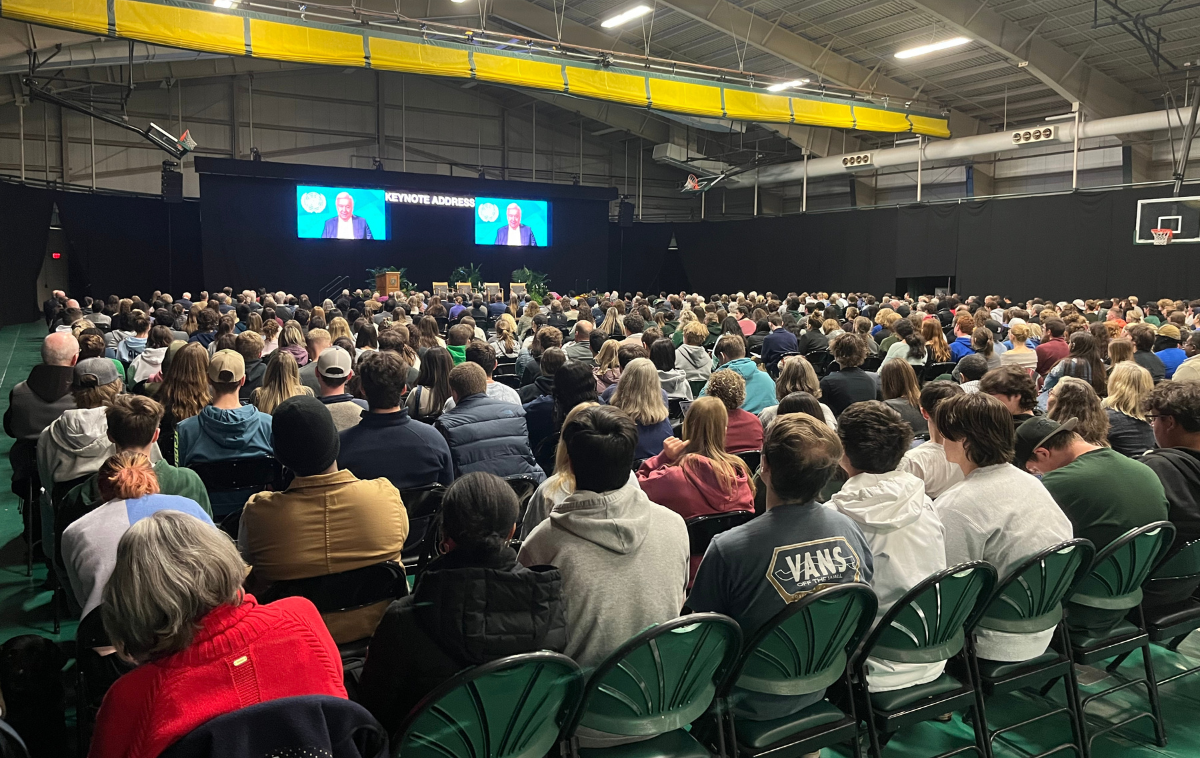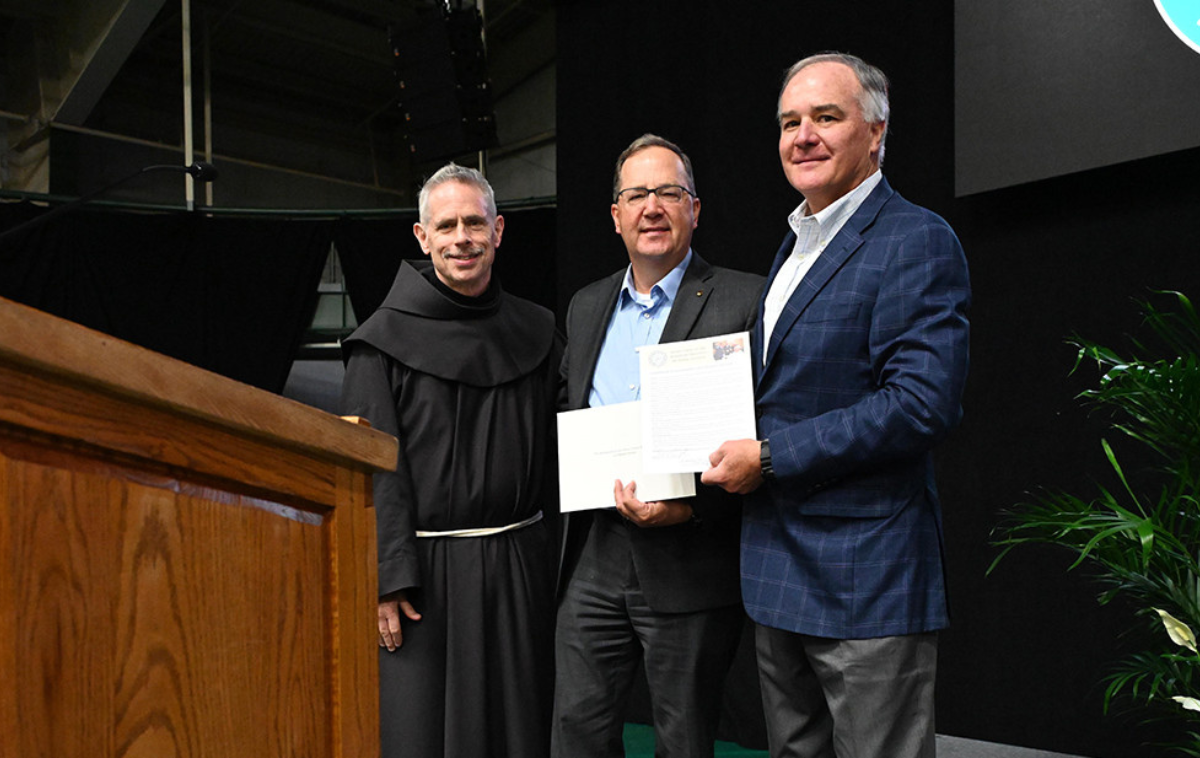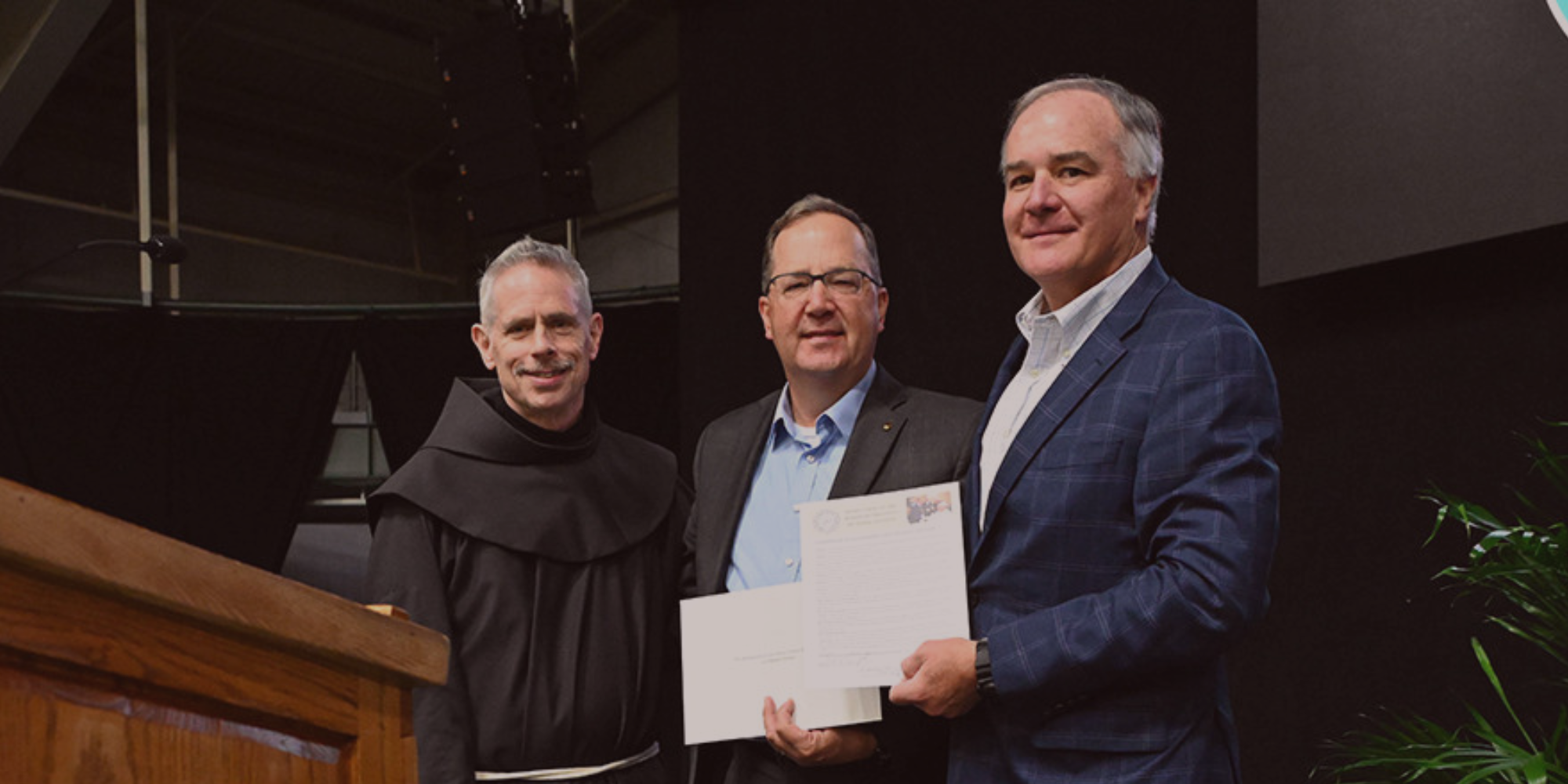Siena College friars host integral ecology symposium
Date Published: November 05, 2024
By Eli Pacheco
With every record-breaking storm, an exceptionally warm year, and the diminishing abundance of God’s creation, evidence of the climate crisis rises to a collective consciousness.
Friars and others concerned with integral ecology recently gathered to consider the impact of the climate crisis on our common home—especially people’s role in combating the global problem.
More than 1,000 students, staff, and visitors participated in Siena College’s “Earth’s Cry, Humanity’s Call: A Symposium on Integral Ecology” in October, a forum to examine the climate crisis from a Franciscan perspective.
Integral ecology acknowledges the connection between humans, nature, and society and promotes the belief that a holistic, integrated strategy is crucial to economic, environmental, political and social matters.
Brothers Michael Perry, OFM, Jacek Orzechowski, OFM, and Jimmy Kernan, OFM, organized the event.
"We thought about organizing a conference to draw attention to it, to have some speakers come in and give us some complexity and background, and then from a Catholic social teaching perspective, (suggest) how we could bring our faith to promoting peace and the healing of the region,” Br. Michael said.
“The longer we talked, the more we realized that the whole question of the issues of peace and war were connected to much larger narratives."
Responding in the spirit of Francis
The symposium, organized by Siena’s Laudato Si’ Center for Integral Ecology and co-sponsored by the Province of Our Lady of Guadalupe, explored consequences and responses in the spirit of St. Francis, patron saint of ecology, and Pope Francis, his namesake, who submitted a letter to be read before the assembly.
Siena senior Tim Nigro read Pope Francis’ letter, in which the pontiff expressed hope that this crisis will call attention to the world’s “deeper ethical and spiritual” implications and that it “demands an ‘ecological conversion.’”
Such a conversion “recognizes that issues of environmental justice cannot be separated from the greater pursuit of an integral human development for all the members of our human family, especially the poor and those who have no voice,” Pope Francis wrote.
Br. Jacek is the associate director of Siena’s Laudato Si’ Center. In service with the Order worldwide, he has been to nations where he says the urgency is “in your face.”
“Unless we begin to tackle the issue of climate change, the problems will be hugely magnified,” he told OSV News. “We're talking about up to 1 billion (climate) refugees over the next 30 years.”
Br. Jacek wants to “empower students” to answer the church's call “to evangelize in a way to this ecological conversion that Pope St. John Paul II, Pope Benedict XVI, and Pope Francis have talked about,” he said.
Climate collapse puts justice and peace ‘in peril’
Students played a prominent role as panelists and moderators and creating posters to raise awareness. Students from St. Bonaventure University in Upstate New York—another Franciscan institution—also attended.
Br. Jimmy, another event organizer, is a lecturer in physics at Siena, assistant director of the Laudato Sí Center for Integral Ecology, and friar in residence in Hines Hall. He said alumni came to discuss job opportunities and other avenues to involvement - from science and technology and beyond.
One of the great aims of the symposium – one of the first events that they held – was an opportunity for students and people who attended in person to meet with organizations who work in integral ecology, including employers in the field, added Br. Jimmy.
In a recorded video keynote address, United Nations Secretary General António Guterres said the “real-time climate collapse” affects the most defenseless populations and that its devastating blows put justice and peace “in peril.”
“The very people most at risk are those who did the least to cause the crisis: small island states, developing countries, the poor and the vulnerable,” Guterres said.
Guterres called upon his “brothers and sisters,” young people and those in the religious community to play a role in finding a solution. Participants discussed the impact of local elections in achieving that goal.

Dozens of people attended the symposium at Siena College.
1 billion climate refugees in next 30 years
Br. Jacek is the associate director of Siena’s Laudato Si’ Center. In service with the Order worldwide, he has been to nations where he says the urgency is “in your face.”
“Unless we begin to tackle the issue of climate change, the problems will be hugely magnified,” he told OSV News. “We're talking about up to 1 billion (climate) refugees over the next 30 years.”
Guterres cited record high temperatures and intense weather events, such as hurricanes, searing heat in Africa and Asia, and coral bleaching from warmer oceans.
Br. Michael, who was head of the global Franciscan Order from 2013 to 2021, met in April to ask Guterres to participate in the symposium.
Studies show global emissions must decrease by 45 percent in five years to maintain the 1.5 C threshold—a safer-limit standard in the Paris Agreement agreed upon in 2015 to restrict global warming to less than 2 C by 21000.
According to a recent report in Nature, a scientific journal, climate change will negatively impact the world even at 1.5 C.
Ways to reduce emissions and face climate impacts
Guterres said the U.S. must keep promises to help developing countries reduce emissions and face climate impacts. This includes contributions to the Loss and Damage Fund, a United Nations financial assistance program. U.S. Congressman Paul Tonko (D) and New York Senator Jake Ashby (R) spoke at a welcome reception hosted by Siena’s friars.
They agreed on several initiatives, including:
Creation of green jobs
Alternative energy development
Ongoing research
"As a Franciscan institution, it is imperative that we explore these issues and their solutions through the lenses of compassionate leadership, inclusivity, and innovation,” said Siena President Charles Seifert of the school’s commitment to finding solutions.
See recordings from the symposium on Siena’s website.
Seifert, with BOT Chairman Thomas Baldwin Jr. And Br. Michael signed the Board’s Resolution on Sustainability, which it implemented in early 2024.
Guterres cited Pope Francis in his address and the Pope’s 2015 encyclical “Laudato Si', on Care for Our Common Home.”

President Church Seifert, Board of Trustees Chairman Thomas Baldwin Jr. '81, and Br. Michael Perry sign the board's Resolution on Sustainability, adopted in March 2024. The resolution stated the Siena’s commitment to sustainability and ecological conversion.
Symposium inspires brother’s homily
Br. Mike Johnson, OFM, expressed the inspiration the friars who organized the event had on him at Mass.
“After the very powerful days you work so hard to create, know that I threw out my homily on Saturday and tried to share some of what was imparted,” Br. Mike said. “Thought you would like to see that your efforts bore fruit.”
In his homily, Br. Mike asserted that not striving for more sustainable living violates the eighth commandment: Thou shalt not steal.
“We have not lived sustainably for a very long time,” he said. “And we are robbing our children and our children's children of our future. We need to be so much better.”
Br. Mike also pledged to improve sustainability to reduce the harmful effects of microplastics in his parish's ministry of feeding the poor, which serves more than 100 people daily.
“That is 100 water bottles going out of here daily," he said. “That is over 30,000 a year, and that needs to stop. I will figure out, you have my promise, how to continue to keep our people hydrated and how to do it sustainably.”
See Br. Michael’s hominy here.

